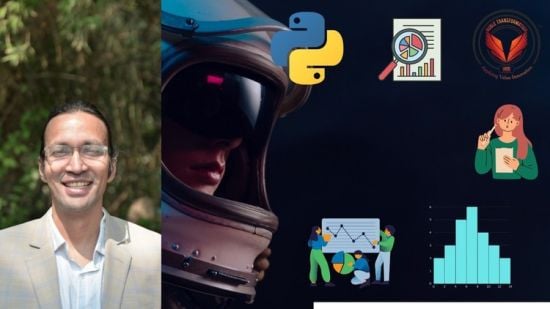
Published 9/2024
Duration: 10h18m | Video: .MP4, 1920×1080 30 fps | Audio: AAC, 44.1 kHz, 2ch | Size: 3.85 GB
Genre: eLearning | Language: English
Real time case study
What you’ll learn
Introduction to Data Science
Data Science Session Part 2 Overview
Data Science Vs Traditional Analysis Overview
Data Scientist Introduction to the role of a Data Scientist, including skills, tools, and responsibilities.
Data Science Process Overview
Introduction to Python for Data Science Overview
Python Libraries for Data Science Overview
Introduction to R for Data Science
Requirements
Anyone can learn this class it is very simple.
Description
1. Introduction to Data Science
Overview:-
This section provides a broad introduction to Data Science, its significance, and its impact across various industries.
Topics Covered:-
What is Data Science?
The Importance of Data in the Modern World
Applications of Data Science in Various Domains
Key Roles in Data Science: Data Scientists, Data Engineers, and Data Analysts
Learning Outcomes:-
Understand the basics of Data Science and its relevance.
Identify key roles and applications of Data Science.
2. Data Science Session Part 2
Overview:-
A continuation of the introduction, diving deeper into the tools and technologies used in Data Science.
Topics Covered:-
Overview of Data Science Tools and Technologies
Introduction to Data Wrangling, Exploration, and Visualization
Understanding Big Data and its Challenges
Real-World Case Studies in Data Science
Learning Outcomes:-
Gain insight into the tools and techniques used in Data Science.
Analyze real-world examples of Data Science in action.
3. Data Science Vs Traditional Analysis
Overview:-
This section contrasts Data Science with traditional data analysis techniques, highlighting the differences and advancements.
Topics Covered:-
Traditional Data Analysis Techniques
Evolution from Traditional Analysis to Data Science
Differences in Methodology, Tools, and Outcomes
Advantages of Data Science over Traditional Analysis
Learning Outcomes:-
Understand the evolution from traditional analysis to Data Science.
Identify the key differences and advantages of Data Science.
4. Data Scientist Part 1
Overview:-
Introduction to the role of a Data Scientist, including skills, tools, and responsibilities.
Topics Covered:-
Who is a Data Scientist?
Essential Skills for Data Scientists: Programming, Statistics, and Domain Knowledge
Common Tools Used by Data Scientists
The Day-to-Day Responsibilities of a Data Scientist
Learning Outcomes:-
Understand the role and importance of a Data Scientist.
Identify the essential skills and tools required for a Data Scientist.
5. Data Scientist Part 2
Overview:-
A deeper dive into the practical aspects of being a Data Scientist, including challenges and career opportunities.
Topics Covered:-
Challenges Faced by Data Scientists
Ethical Considerations in Data Science
Career Pathways and Growth Opportunities for Data Scientists
Building a Portfolio and Gaining Practical Experience
Learning Outcomes:-
Gain insight into the challenges and ethical considerations in Data Science.
Learn about career opportunities and how to build a strong Data Science portfolio.
6. Data Science Process Overview
Overview:-
An overview of the Data Science process, including stages and methodologies.
Topics Covered:-
The Data Science Lifecycle
Understanding Data Collection and Data Cleaning
Exploratory Data Analysis (EDA)
Model Building and Evaluation
Deployment and Monitoring of Data Science Models
Learning Outcomes:-
Understand the stages involved in the Data Science process.
Gain a high-level understanding of each step from data collection to model deployment.
7. Data Science Process Overview Part 2
Overview:-
Continuation of the Data Science process, focusing on more advanced concepts and tools.
Topics Covered:-
Advanced Data Cleaning Techniques
Feature Engineering and Selection
Hyperparameter Tuning and Model Optimization
Introduction to Model Interpretability
Post-Deployment Monitoring and Maintenance
Learning Outcomes:-
Master advanced techniques in the Data Science process.
Learn how to optimize models and ensure they remain effective post-deployment.
8. Introduction to Python for Data Science
Overview:-
This section introduces Python as a primary tool for Data Science.
Topics Covered:-
Why Python for Data Science?
Setting Up the Python Environment for Data Science
Introduction to Jupyter Notebooks
Basic Python Syntax and Operations
Overview of Python Libraries for Data Science
Learning Outcomes:-
Set up and use Python for Data Science tasks.
Write basic Python code and use Jupyter Notebooks.
9. Python Libraries for Data Science
Overview:-
A focused introduction to essential Python libraries used in Data Science.
Topics Covered
Overview of NumPy, Pandas, Matplotlib, and Seaborn
Working with NumPy Arrays
Data Manipulation with Pandas
Data Visualization with Matplotlib and Seaborn
Introduction to SciPy and Scikit-Learn for Machine Learning
Learning Outcomes:-
Gain proficiency in using essential Python libraries for data manipulation and visualization.
Prepare data for analysis and build simple visualizations.
10. Introduction to R for Data Science
Overview:-
Introduces R as an alternative tool for Data Science, focusing on its strengths and ecosystem.
Topics Covered:-
Why R for Data Science?
Setting Up the R Environment
Basic R Syntax and Operations
Introduction to RStudio
Overview of R Libraries for Data Science (e.g., dplyr, ggplot2)
Learning Outcomes:-
Set up and use R for Data Science tasks.
Write basic R code and use RStudio effectively.
Who this course is for
Anyone who wants to learn future skills and become Data Scientist, Ai Scientist, Ai Engineer, Ai Researcher & Ai Expert.
Password/解压密码www.tbtos.com
转载请注明:0daytown » Deep Data Science AIML End to End Master Class TM